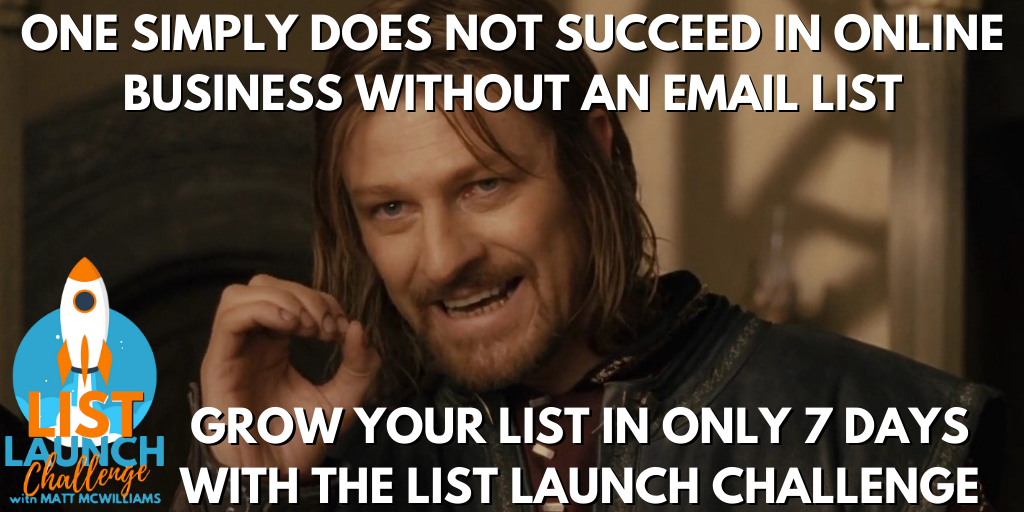Breaking news…the FTC has released new guidelines that have a huge effect on affiliate marketers and affiliate programs. Are they good? Are they bad? What are the details? This episode has you covered.
Click Here for The Written Transcript of This Episode
If you are ready to take your business to the next level and start an affiliate program, start with my free report, Your First 100 Affiliates. This report takes nearly two decades of experience, trial and error, and lessons learned about finding top affiliates in nearly every conceivable niche and puts them all into one report. Grab your copy here!
LINKS MENTIONED IN THIS EPISODE
2023 FTC Endorsement Guidelines
Text me at 260-217-4619
Don’t Miss An Episode – Subscribe Below
Previous Episodes of The Affiliate Guy
Why Affiliate Marketing Is Easier Than You Think
Why Your Affiliate Program is Failing (And What to Do About It)
How to Build Strong Relationships with Your Affiliates
10 Lessons I Learned Launching a Bestselling Book
BREAKING NEWS: What the 2023 FTC Updates Mean for Affiliate Marketing
So there’s huge news in the affiliate world. The FTC has released new guidelines that have a huge effect on affiliate marketers and affiliate programs.
So many questions like, are they good? Are they bad? What are the details?
How does this affect social media? All this stuff? Well, listen up, because this episode code has you covered. So you may or may not have heard that the FTC has updated its Endorsement Guides.
The Endorsement Guide is the source of the disclosure rules, right? If you know as an affiliate, you have to disclose that you were an affiliate. Well, this Endorsement Guide is the source of the disclosure rules that affiliate marketers and influencers, and other marketers have to follow.
We’ve been expecting this for years, actually. I mean, influencers became a term, I don’t know, maybe seven, eight years ago. I don’t know what took them so long. I don’t know why these didn’t come out four or five years ago. People are, like, freaking out. Why these were not out in 2018, or 2019 is beyond me, other than they’re from a government agency.
And I’ve had encounters with the FTC in the past. I’ve spent multiple days in a conference room with FTC attorneys. And let me just say, one of the funniest things ever was we kept talking about pay-per-click marketing, and they kept translating it as paperclip marketing.
Having spent that time with the FTC attorneys, I know just how slow they move and how bureaucratic it is. Now, aside from that bureaucracy, the reality is they finally did come up with this stuff, and they actually back in, I think it was May or June about a year ago, May or June of 2022, they proposed the guideline changes.
There is very little that came out this year. I think these came out at the very end of June 2023. There’s very little in these Endorsement Guide updates that weren’t proposed over a year ago. There are no surprises here.
But, yeah, I mean, this fundamentally, they clarify some stuff. I think that the big thing that I’m getting from this, is they clarify some of those things where there was a lot of gray area. Now they left a lot of gray areas.
We’ll talk about this. It’s kind of annoying because there are some areas where it’s still like, oh, my gosh, could you just give us a black-and-white answer? And they don’t, now, before we go any further, my attorney has made sure that I got to cover the legal stuff here, and I’ll use my best lawyer voice now.
What I say in this episode is designed to provide accuracy and I can’t keep that up. Anyway, what I say in this episode is designed to provide accurate and authoritative information. Yes, I am reading this directly from the script.
About the new FTC guidelines and affiliate marketing. Neither I nor my company is engaged in rendering legal, accounting or other professional services by publishing this episode. If any such assistance is required, the services of a strongly qualified legal professional should be sought. I and my team will not be held responsible for any liability, loss, or risk incurred as a result of the use and application of any information contained in this episode.
All right, so what does that mean? This means I strongly encourage you, if you have any doubts whatsoever about anything I say or that you read online about this, to ask a qualified and licensed attorney, not some guy that hosts a podcast. Now, that being said, it’s my job to know these things.
We run multiple affiliate programs. I run an agency. I am in this world. So it’s my job to be on top of these things and to know this stuff. I have personally consulted our attorney, who in turn consulted a specialized attorney on these matters, and gave me some advice.
Basically, he translated the FTC’s some of their stuff is just mumbo jumbo into something I can understand and take action on. Now, the big takeaway here is the big thing here. This is not all doom and gloom.
It’s not going to add more than half an hour to an hour to a month to an affiliate manager’s job, or anyone else for that matter. It’s not that bad. Okay?
It’s not that bad. So this is not bad news. Most people are doing 90% of the stuff that they say in their endorsement guidelines.
They’re just codifying. They’re saying, hey, this thing that 90% of you are doing, keep doing it. The 10% of you that aren’t, do it like the other 90%.
If I could sum it up, that’s basically what it is. I would say 80% to 90% of you, and again, don’t take this as legal advice. We’ll cover a bunch of stuff we’re not going to cover at all. 80-90% of you probably don’t need to do anything.
Of all the affiliates I’ve worked with over the past few years like I said, I’ll go low and say 75% of you don’t need to do anything. 10 to 20% of you need to do a little, and then 5-10 percent of you need to do a lot. Okay?
So what’s the background on all of this? Well, the big thing is that this was ultimately, this was about fighting against the deceptive, dishonest reviews, the deceptive, and Dishonest endorsements. But of course, it affects every single affiliate marketer.
It affects every single affiliate manager. It affects every single influencer, literally anyone who might endorse a product. So bloggers, podcasters, affiliates, agencies, affiliate managers, advertisers, affiliate networks, you name it, this affects them.
Now, that was the root of all this. That was the root was mostly that 1%. If it’s even 1%, it’s probably one 20th of 1% of the people out there who are writing fake reviews. Fake. That was the word I was looking for. Fake reviews, dishonest reviews, and things like that.
So because of the bad apples, the one 20th of 1%, now all of us have to go through all these hoops. And again, it’s not that big of a deal, but we got to go through all these hoops. So that was the root of it.
But of course, there are other resulting consequences. One of the big questions I’ve been hearing is, was this targeted at affiliate marketers? And in a way, yes, that’s probably the short answer.
But the bulk of it was targeted towards influencers and affiliates because they’re the people who are getting paid for these things. The bulk of this is not targeted at Joe Blow, an average reviewer who just goes and writes a review about his favorite product or whatever, or writes a poor review or good review, whatever. That’s not what they were targeted at.
It was targeted at people who have a monetary incentive to say nice things about a product or service. That’s it. And many times that’s affiliates.
So I’m going to cover some of the highlights as I see them, and as we got legal advice on this, I’m going to cover some specifics. I’m going to cover some action items that you need to put into play right away. I’m also going to link directly to the new guidelines on the FTC site that’s in the show notes so you can review them.
So again, if something doesn’t make sense, my first action will be to go read the guidelines, and then if it still doesn’t make sense, ask an attorney to be 100% safe. So, full disclosure before we go any further, this is a boring episode, in my opinion. This is not like how to increase your sales and all this.
This is how you do the little thing that you have to do to make sure you’re in compliance with the law so you don’t get in trouble. I can help you increase your sales by 100%, 200%, quadruple your sales, and I can help you do all those things. I can help you do better.
I can help you get more registrants on a webinar and do all those things. But if you’re not legal, you’re going to be in a world of hurt. Trust me.
I face a lawsuit now. It got dropped because I wasn’t doing anything wrong, but we got accused of doing something wrong. I’ve shared that story before.
I got accused of doing something wrong. And I got to spend yeah, I got to spend three days or two days, two full days, and then a part of a day in a conference room with FTC attorneys who kept calling it paperclip marketing, not pay-per-click. As though at that time, I was selling office supplies.
I wasn’t anyway, bureaucrats. I know what it’s like to face that. And even though I got I had no issues, they ended up taking me off the lawsuit, and they just decided it was basically a waste of their time.
I’ve still been there and faced that, and it was scary. And even though I did nothing wrong, I still racked up thousands of dollars in legal bills to get good advice. So don’t put yourself in that situation. Do everything you can. I’ll talk about this as we go. There’s a reason why I ended up getting off completely.
It’s because I had done the right things. I was accused, and it seemed like we were doing some wrong things, but then I showed them the mounds of evidence, and they went, oh, my gosh. Yeah.
You’re doing exactly what we tell people to do. All right, so this is from the FTC. I’m going to read a little bit of the report again. We’re going to link to this. I’m not going to just read this whole thing because it’s long.
What is an endorsement? They literally start off by saying, according to the dictionary, an endorsement is a recommendation of something or an expression of approval or support for something. But the Endorsement Guides are talking about a particular type of endorsement. As used in the Guides, an endorsement is an advertising message that consumers are likely to believe reflects the opinions or beliefs of someone other than the sponsoring advertiser.
So if the message isn’t an advertising message by or on behalf of a marketer, it isn’t an endorsement. Okay? That’s exactly what we do as affiliates. Right?
Tired of having a small (or no) email list? It’s time to start growing your fast and easy! Grab my new book Turn Your Passions Into Profits now and watch our subscribe count soar!
We are not the advertiser, we’re not the owner of the company, we’re not the product itself, and we say things about it. One of the first things they write is, do the Endorsement Guides apply to social media? Yes. Truth in advertising is important in all media.
Whether they have been around for many decades, like television and magazines or are relatively new, like social media. That’s the second thing there, right there. Okay, the question isn’t it common knowledge that social media influencers, bloggers and other content creators are paid to tout products?
Or that if you click on their links to buy a product, they will get a commission? It may be common knowledge that some of them get paid this way. This is the key thing here.
But others may have no connection to marketers whose products they mention. They may not get a commission or anything else for their recommendations, which they may be making only because they believe in those products. Moreover, the existence of financial arrangements between some content creators and advertisers may be apparent to some people, but not to everyone.
Under the law, an act or practice is deceptive. If it misleads, “a significant minority.” They use that term a lot. A significant minority of consumers. That’s why disclosure is important. What the heck is a significant minority?
I don’t know. They don’t define it. So I’m just going to again, the point there is like, yeah, we all know, we go to websites, we see somebody promoting something, and we see that they’re an affiliate, we’re like, that’s an affiliate fellow but does everyone, does your mom, your 82-year-old mom understand that? Maybe, maybe not.
Do the people that you go to church with or to synagogue with or to the mosque with, they’re not in the marketing world? If you went and polled 20 of them, would more than 19 of them know that that’s an affiliate link? Probably not.
So, therefore, a significant minority don’t. So that’s why we disclose. All right, here are some highlights from the new endorsement guides.
Most of these are really just clarifications on things that they wrote back in 2009 and 2010, but they’ve really clarified these, especially for social media, because social media we had Twitter back then, and Facebook was kind of around, but not nearly to the effect of what we have now.
All right, first thing, nearly everyone can now be held responsible for violations. It used to be that it really was just the affiliate program and the person who posted the content.
And really, if the affiliate program did what they were supposed to do, they could not be held responsible. If the affiliate did what they were supposed to do, they could not be held responsible. It’s really now everyone bloggers, podcasters, influencers affiliates, agencies advertisers just about everyone.
One of the things they didn’t mention, I thought was interesting, they did not mention, like, affiliate networks or tracking platforms. This is where it gets kind of this gray area. If the affiliate network is acting in the capacity as an agency, well, then they’re in the agency role, so it does affect them.
But if I run my affiliate program on a network and there’s an affiliate, the affiliate network is kind of the middleman. I’m not clear yet on the impact. So I don’t know if they’re going to clarify that.
Probably if enough people ask, they’ll probably clarify it sometime in like 2030. Knowing the FTC, they’ll move slower than the speed of smell on this, but we’ll see right now there is no clarity on that. They’ll probably have some proposed changes in 2029 and then actually update it in 2030, by which point we’ll have like 14 new social media networks and threads from Instagram will be like a thing of the past. I don’t know, we’ll see.
Second, big takeaway or kind of highlight. Affiliate managers advertisers affiliate programs. They now have clear responsibilities. Three clear responsibilities are specifically mentioned in the guidelines, and I’m paraphrasing here, but number one, providing guidance on the rules. You have to tell your affiliates, you have to let your affiliates know what the rules are.
You should send out an email or post in your Facebook group very, very soon. We will be doing this in the next week. Providing guidance on the rules.
Secondly, you’ve got to monitor compliance and we’ll talk about this a little bit later. You’ve got to monitor your affiliates. You’ve got to keep tabs on them and what they’re doing.
If they’re breaking the rules, you need to be reaching out to them. Again, we’ll talk about that. And then third, you got to take action in the event of non-compliance. I’m going to talk about what those mean more here in a little bit, shortly.
The third big takeaway is review sites cannot accept payment for rankings. There are huge affiliate websites. So review websites that rank, say, a brand or a product higher based on the site accepting money from the brand. Those are considered deceptive. Both the website owner and the brand can be held liable.
And if you’re an affiliate manager kind of in the middle, you can be held liable as well. So the site can use affiliate links in general and they can disclose them as long as payments are not taken for higher rankings. This is a direct quote from the guidelines.
Any “methodology that results in higher rankings for products whose sellers have a relationship to the operator because of those relationships” is misleading. That’s deceptive. So review site operators out there, you cannot accept payments for rankings.
The fourth, big takeaway is “clear and conspicuous.” They’ve said clear and conspicuous before. Now the translation is unavoidable.
The disclosure must be unavoidable. You must be able to engage with the content and seeing the disclosure is unavoidable. Now, there are some gray areas and we’ll talk about those a little bit later, where maybe the platform on a specific type of device makes making it unavoidable almost impossible.
They do make an account of that. There’s some leeway is what I’m saying there. But basically clear and conspicuous now means unavoidable.
The fifth one is relying on the built-in disclosure tools that social media platforms offer, it’s just not enough. If the tools make the disclosure not satisfy that clear and conspicuous, aka unavoidable rule, then you can use them. But if what they have isn’t sufficient, you have to add to that. In other words, it’s on you to disclose, not the social media platform. All right?
And then lastly, effective disclosures are based on who is being targeted as the audience.
So effective disclosure is different if you’ve got children, it’s different. If you’ve got elderly people, it’s different if you were targeting blind people, okay? Then you would have to account for that, right?
And I don’t know exactly the deal with that, because I don’t work with any brands that target blind people. But I’m assuming you have to have the audio version, right? You have to disclose in the audio, not just in the text, because you’re targeting blind people.
If you were targeting people who speak a foreign language, then you can’t disclose in English if your entire ad is in Spanish, and then you disclose in English. That’s not compliance. They’ve now made that clear. You could get away with that before, but you can’t now.
So which of the guidelines are most relevant to affiliate marketers? I’ve got seven guidelines here that kind of stood out to me as relevant most to affiliate marketers.
The first one is just putting an affiliate link or just an affiliate or commissionable link, any of those types of terms. That’s not adequate. Not adequate anymore. A paid link is now go paid link, an affiliate link. Well, I mean, the good news is, let me count the letters here. Paid is five letters shorter than affiliate.
So it does actually give you some leeway there. Again, the reason for that is there is an assumption that if you’re in English speaking, there’s an assumption that if you’re targeting most Americans, for example, that paid link, they understand the word paid and they understand what a link is.
Affiliate link, again, would a significant minority of people know what the word affiliate means? Not necessarily. I don’t believe that more than 90% of people in most industries know what an affiliate is. That means a significant minority 10%, don’t know what that means. That’s why it’s no longer allowed.
The second big one for affiliates is just endorsers can be held liable for a review when they represent falsely that they personally use the product.
They’re calling you out on this. If you have not personally used the product, and you suggest that you have, you’re facing some serious stuff. Like there’s no that’s a definite $1 million fine or anything like that, but you could be looking at a loss of all of your commissions.
The FTC could sue you for something. And again, I’m not saying it will be this or not be this, but all of your commissions plus a fine of potentially an equal amount and more, I mean, there could be some serious penalties. This was a big one tags in social media posts can be considered endorsements.
And if it’s an endorsement, you have to disclose it. So if you have any material connection to a brand, if all you do is post a picture of the shoes you’re wearing and you tag the brand, but they’ve sent you a free product or they’re paying you in any way, that’s enough. Like that’s it.
That’s an ad and you have to disclose it. Now, if all you did was take a picture of your shoes and there’s no significant branding on the shoes, and I don’t know again, this is a gray area. If you take a picture of Nike’s, that all Nikes have the swoosh, okay. And you got them for free. Is that an ad? I don’t know that’s kind of one of those.
I don’t know that I found that in the stuff and I’ve got some stuff later. I’m going to cover some specific instances that my attorney sent me some notes on because he translated. And maybe when I get down there in my notes, I’ll cover this.
But again, just tagging the brand that’s considered an endorsement and tagging the brand is also not a sufficient disclosure. So you’ve got to still disclose fully.
Another one, an influencer cannot simply disclose connections to a brand on their profile page. That’s been done in the past and there was no penalty if that was what was done before now because they weren’t profile pages didn’t exist when these rules came out initially 13 years ago.
So now the disclosure has to be done on the post and again, be unavoidable when viewing it. So you can’t just have it on the profile page. That’s how people got around making it unavoidable for the last 13 years.
So these are some like if you’ve got videos, this was something that stood out to me. You got to have adequate disclosure on videos. So quote, I’m quoting what they say.
This video is paid for by brand or brand such and such paid me to tell you about it. Or Company X gave me such and such product or the products I’m going to use in the video were given to me by their manufacturers. Those are some examples.
My suggestion is when they give you suggested wording, you probably take that and don’t tweak it a whole lot. So for social media, examples that are given for social media are ad and then so it’s ad at the beginning, hashtag ad paid ad, advertising at the beginning, advertisement sponsored promotion sponsored by X, promotion by X. Adding ad to the end of the brand name to create a hashtag is not enough.
They specifically say that. So if you just put like if you’re promoting something and then you put company name ad not enough. Saying thanks to the brand is not enough.
But saying thanks brand for the free product, that would be a sufficient disclosure. The hashtag endorsement is not sufficient. The hashtags Ambassador and Partner work only if you include the brand name in the hashtag.
So you would have to say like hashtag company name Ambassador, company name partner. The hashtags comped and hosted are not sufficient for free travel. I mean, they’re very specific, they outline it, they make it really easy for you and I appreciate that on some of these.
Now this is interesting, the last one here. Podcasters do not need to disclose content that is obviously commercial as long as the podcaster upholds any views expressed. What is obviously a commercial?
Would a significant minority not know that it’s commercial if in the middle of my podcast, I suddenly started playing music and said, hey, let me take a moment to tell you about product X. Not that I would talk that way, but see, it’s tough. It’s a tough little middle ground if they were not clear.
If I do an interview with a brand and I don’t do this a ton I’ve done this maybe ten times out of 550 some odd episodes. But if I do an interview with somebody and we send them to a webinar that’s an affiliate link to my audience. I don’t believe a significant minority would not know that that’s an affiliate link because of my audience.
And I think it would totally be fine if I don’t disclose unavoidably in that podcast again because of who my audience is. But if you have an audience of, say, just regular people who aren’t in the affiliate marketing world, yeah, I think you would have to say something, but it’s not really clear. There’s a gray area there and I don’t know, that’s probably something they need to figure out.
As far as free products, a couple of things real quick, really just one big thing. If a brand sends a coupon to you for free product, any resulting post would need to be disclosed. It’s interesting if they send you a coupon to get something for free, then you’ve got to disclose even if you’re so much as just using it.
Like they could make a case, especially if there’s branding on it. Now, if there’s no braining on it whatsoever, I’m just going to use, for example, I’ve got a coffee mug right here. This coffee mug has no brain, actually has my brand on it, but it was sent to me for free.
Me drinking out of this mug on camera is not an endorsement of the company that sent it to me. The company that sent it to me is not even a coffee mug company, but my water bottle. There’s significant braining on this.
This is not an ad. I did not receive it for free. But pretend I did receive this Hydro peak water bottle, which I think is great, and I’m not going to have an affiliate link for it, so I can say whatever I want and not have to disclose anything.
But if I rank from it on camera and you could see the Hydropeak logo and it was sent to me for free by Hydropeak, I would probably need to disclose that I got it for free. So that’s kind of that grayish area there where you’re probably best off either not talking about it or not using it on camera. I don’t know.
It’s just a weird thing because if you’re not going to make any money from it, if you’re not going to link to it is that an advertisement? No. Yeah, and I think you’re fine, but if you’re going to link to it below your video at all, you would need to disclose you got it for free.
So I mentioned earlier, I talk a little bit more about okay. What does it mean when I say affiliate managers, advertisers and others have a clear responsibility to provide guidance on the rules, monetary compliance, and taking action in the event of non-compliance, and I’m quoting directly from their stuff sufficient to remedy non-compliance and prevent future non-compliance?
So when you take action, you have to account for the fact that they gain something and you gain something from the non-compliance and prevent future non-compliance. So number one, you need to not only instruct your affiliates about the need to disclose their connection, you’ve got to do that. You have to give them guidance that any statements made by them as an affiliate are truthful and I’m quoting, truthful and substantiated.
In my free report, 75 Powerful Lead Magnets, I show you exactly what types of lead magnets actually convert and lead to explosive list growth. Grab your copy here!
So what does that mean? You have to tell your affiliates, don’t lie. You actually have to tell them that in your stuff.
Like you have to tell them that. And if you tell them that, does that mean they won’t? Of course not, but you have to tell them from an affiliate manager of an affiliate agency.
We sort of got an answer here and I’m going to quote here, “advertising agencies, public relations firms, review brokers and other similar intermediaries can be liable when they quote, create or disseminate endorsements that they either knew or should have known were deceptive.” What does that mean? What does that mean that if you send out any type of endorsements or you knowingly, like if you know an affiliate is doing something wrong and you don’t know anything about it, you will be held liable.
But you can also be held liable when you work with affiliates, as they say, when you hire and direct endorsers who don’t properly disclose. I’m going to quote here one last one, this directly from our attorney. Your company must have, “reasonable programs in place to train and monitor the influencers you pay and direct.”
What that means to me. And what we are doing as an affiliate management agency is, number one, we’re going to make sure to educate our affiliates now in summer of 2023 about the new guidelines. But two, we’re going to remind them consistently, not in every single communication, but a reasonable program in place is, I feel like, once a month or so.
We’re going to make sure to remind them that they follow the guidelines in our affiliate portals. We’re going to make sure that they follow the guidelines when they sign up. Initially, we’re going to make sure that they know they need to follow the guidelines.
We’re going to make sure that they agree to follow the guidelines to even sign up. All right, so those are the reasonable programs. Does it mean we can catch everything, we can prevent everything? Of course not. Absolutely not. But we have reasonable programs.
We’ll put reasonable programs in place. As far as monitoring your affiliates, they really don’t give specifics. They say reasonable efforts. Reasonable efforts. Well, what the heck is a reasonable effort? The truth is, I don’t know.
But at the end, I’m going to tell you. I’m going to give you some like, okay, here’s what to actually do as a result of this, all right? So I’m going to go through a couple of specifics that I found interesting, again from our attorney.
These are specific situations that the FTC discusses and give insight into the right way to do things. The first one I talked about earlier, adding ad or similar disclosure in the caption of a TikTok is not enough. It needs to be overlaid in the video itself.
And by the way, I’m quoting directly from the attorney here, and then I’m going to read what they say on the FTC guidelines, and then we’re going to talk about specifically what actions you need to take as an affiliate manager or affiliate. So it says if I upload a video to TikTok and that video requires a disclosure, can I put the disclosure in the text description of the video?
“The text description on TikTok is in small print. It doesn’t stand out, and it often doesn’t contrast against the background of the video. Also, TikTok videos have many competing elements. A disclosure in the text description is thus very unlikely to be clear and conspicuous. When content creators want viewers to read something, they superimpose much larger text over their videos.”
So there you go. On TikTok, de-influencing campaigns require a disclosure. The example they give here, I’m a skincare influencer and I have an endorsement deal with a brand.
If I post negative comments about a competing brand, do I have to disclose my endorsement deal? Yes. That’s the short answer.
They go on to describe why, yes you do. Foreign creators making content that will be seen by US customers must comply with the FTC’s rules. It says, I’m in London, I produce YouTube videos.
Do I need to tell my viewers that I’ve been paid to endorse the products, even though I don’t live in the US. And they say yes? If it’s reasonably foreseeable that your YouTube videos will be seen by and impact US customers, us law would apply to you and you would need a disclosure.
Also, the UK and many other countries have similar laws and policies relating to endorsements, so you want to check those too. This is a big one. This is a big one.
My attorney pointed out if you review many different products on your blog or social page, you need to specifically disclose which content is sponsored and which isn’t a blanket. Some of this is sponsored. Disclosure won’t cut it.
So they say. Would a single disclosure on my homepage that many products discussed on the site are provided free by their manufacturers be enough? And as they say, even if some viewers read the disclosure, it doesn’t tell them which products were and weren’t provided for free by their manufacturers.
So you’ve got to actually have specific disclosures. There another big shift. You can’t hide disclosures behind links, even if the link says something like disclosure.
So they say no. A hyperlink disclosure like that is easily avoidable. Again, it must be easily unavoidable, meaning that the disclosure is not clear and conspicuous.
Most people aren’t going to click on it and will miss the disclosure, et cetera, et cetera. Thank you or thanks, brand is not enough. We covered this earlier, so I won’t go into that one.
But they do say thanks XYZ for the free product, or thanks, XYZ for the gift of ABC product. That is good enough. If that’s all you got from XYZ.
If that’s too many characters for the format, there’s always quote add. So that’s always your fallback, just add. Disclosing sponsored content only at the bottom of a blog or advertorial (only an attorney would use that) term is not enough. Thanks, Jeremy. I’m going to make sure he listens to that part.
Where in my blog should I disclose that my review this is from the FTC, is sponsored by a marketer? Yes, it matters. They say a disclosure should be placed where it easily catches consumers attention and is difficult to miss.
Readers might overlook a disclosure at the very top of the page outside of the blog. Their eyes will probably be drawn to a picture or a headline, and then they will probably read down he highlights this. Consumers may miss a disclosure at the bottom of a blog or page.
Many won’t read till the very end or look after the end. Of the blog itself. A disclosure is more likely to be seen if it’s very close to or even better, part of the endorsement to which it relates.
So what’s the okay, Matt, this is all great, but what do I do right now part? Well, I’ve got five things for affiliate managers and three for affiliates. Number one for you.
Affiliate managers, educate your affiliates. Mention the updates in an email coming up. Let them know that they’ve updated.
Let them know right now. Just say, hey, go read them. I’m studying them, and I’m going to let you know more later.
Feel free to share this episode with them. Seriously, that’s self serving, of course. But seriously, feel free to share the episode with them.
I mentioned earlier when I was sued by the FTC initially, but then I got off easy. Part of the reason why I got off was because I had mounds of evidence. Here’s all the stuff I sent to the affiliates.
Here are the blog posts I posted on our affiliate blog. Here are all the social media posts I did. Here are all the emails I sent to our affiliates telling them how to do this and what to do.
And they went golly. Like, you sent all this to your affiliates. Yes, you still had a couple who skirted the rules, but you sure tried your best to make sure that they follow the rules.
So educating your affiliates, not only is it the right thing to do, but it’ll avoid most problems. You’ll avoid 99% of the problems by educating them. And if for those 1%, when you can show like that you are educating your affiliates, then they take that into account.
The second thing is, you got to monitor your affiliates. Now, if you have 100,000 affiliates, like we did at Shutterfly and Adidas, what does that mean? Like you can’t monitor 100,000 affiliates?
What it means is we monitored our top 100 every month. Our top 100 affiliates accounted for well over 90% of sales, so we monitored them every single month. If you were in our top 100, you were getting monitored.
We then spot checked anyone who kind of came out of nowhere to make a lot of sales. So you might have been our 147th biggest affiliate, but if last month you weren’t even in the top 2000, we monitored you, so we kept track of them. We were probably monitoring 200 to 225 250 every single month.
If you’ve only got 37 affiliates, then at the very least, just monitor the ones making sales. You do not need to monitor the affiliates who are making sales. Now, again, don’t take that as legal advice.
That’s whatever. But I can promise you, if you’re monitoring 100% of the sales, there’s not a problem. If somebody out there, that’s way down the line, it doesn’t even make any sales is lying and saying false things or not disclosing, you’re really going to get in trouble no.
That’s actually what happened when I got sued by the FTC was it was somebody who hadn’t even made a sale that didn’t disclose, and one of our competitors reported them. And after going through the whole rigor roll of everything, the FTC was kind of like, dude, really? That’s the guy that you reported?
He hasn’t even made a sale. He made, like, one sale two years before. And then we definitely, if anybody has broken the rules in the past and we caught them and they fixed it, sometimes it was just an honest mistake.
Sometimes we’ve had people who broke the rules, and they had ten pages where they mentioned us, and nine of them were up to date, one of them wasn’t. But once we catch them, they are now on that list. And so might have seven people.
Again, with a program like Shutterfly or Adidas, we had 50 people. They were caught breaking the rules in the past. We always monitor them.
We would monitor them every single month for a year and then every quarter after that. Like, even if they were number 700, if they were still making sales, we were monitoring them.
So, number one, educate. Number two, monitor. Number three, correct them. You have to have a reasonable way to correct them and assure that they’re going to be compliant and not do it in the future.
So for us, it was like, hey, you have five days to correct this, or you forfeit your commissions earned in the last period. You have to be willing to remove them if needed, at least temporarily. So we’ll say, like, hey, this is important. Here’s why. You have five business days to correct. You forfeit your commissions that are owed to you, and your links will be inactive until this is corrected.
Fourth, continue to educate them. Like, open the fire hose on them right now with everything. And then make sure this is kind of that ongoing stuff.
Once a month, give them a little thing like small bites. Make sure they’re doing one little thing correct. And then lastly, you know, gotta keep educated yourself.
Tired of having a small (or no) email list? It’s time to start growing your fast and easy! Join our List Launch Challenge now and watch our subscribe count soar!
Set up a Google Alert for FTC and affiliate marketing. Make sure you subscribe here. I’m going to be covering it when it happens.
Again, we’re going to keep educating about this, but keep yourself educated. Like, I’ve got that Google Alert set up, so if anything happens, even if it’s just somebody commenting on this over the next couple of weeks, I’m going to make sure I know about it, because maybe somebody’s comment about it provides a little bit more clarity. And I’ll be sure over the next six to ten weeks, if there is like a minor update, I’ll just make sure to maybe throw it on to the end of a podcast episode.
Like, I’m not going to make another whole podcast episode about this, probably in the near future, but maybe I’ll give quick updates. So make sure you subscribe. Keep yourself educated on this and share that education with your affiliates.
For affiliates, I just talked about what your affiliate managers should do, but don’t rely on them for education. Educate yourself. Listen to this again, if you need to, go read up on it.
I’ve got a link in the show notes to the FTC’s guidelines. Go read up on exactly everything. I covered 25 things today. There’s like 100 on there. Go read up on it.
Secondly, make the updates now. If you’ve got social media posts that are scheduled, go update those. If you’ve got blog posts, go check. What are your top ten top 20 blog posts that have affiliate links, and go update those.
Get 90%. The goal here is get 90% compliant in an hour. You could be 90% compliant in 1 hour and then worry about the rest later.
And again, they just released these updates. If three weeks from now you’re 96% compliant, is the FTC going to be jumping down your throat? No, they’re not.
Again, it’s like the 80 20 rule, right? But it’s probably more like the 95 5% of the time you’re going to spend will get you 95% compliant really, really fast. So do that.
And then thirdly, just continue to educate yourself. Just like the affiliate managers. Listen to the podcast.
Go study it yourself. Set up those alerts so you know, okay, when they release some sort of an update in the future, you need to know about it, right? So keep educating yourself about these issues.
They don’t need to be a huge thing. You don’t need to spend hours a year, but 30 minutes, 45 minutes a year just making sure you’re up to date. That’s all you got to do to be compliant.
So I would love to hear from you. If you’ve got any questions about this or you just want to share your biggest takeaway, feel free to text me anytime at 260-217-4619 and ask away then. As I said, I’ll be covering this some more as things pop up and as I learn more or specific situations come up.
But if you’ve got questions I mentioned, I’m not going to do a whole nother episode about it. Maybe I will. Three, or four episodes from now if I got enough questions from you, then I’ll do a whole episode. So shoot me a text.
As I mentioned earlier, make sure you hit subscribe, because not only do you not want to miss the stuff about the FTC stuff you don’t want to miss the next episode, I’m gonna talk about how to attract affiliates with the right commission. So we’re gonna talk about some really creative ways to not only get the right commission but attract affiliates maybe above and beyond commissions. So make sure you hit subscribe so you don’t miss that episode.
I’ll see you then.
Questions?
Text me anytime at (260) 217-4619.
Or…check out some of my free reports to help you get on the right track:
 |
 |
 |
 |
 |
 |
 |
 |
 |











